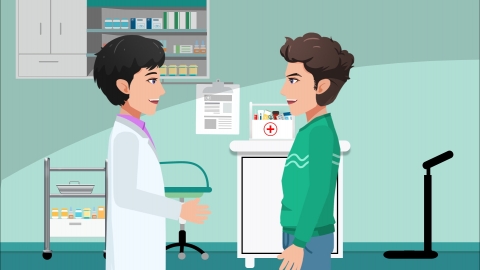Which department should one visit for diaphragmatic hernia?
Hiatal hernia should be evaluated by departments such as cardiothoracic surgery, general surgery, gastroenterology, emergency medicine, or respiratory medicine, depending on the type of hernia and presenting symptoms. For example, congenital diaphragmatic hernias are preferably managed by cardiothoracic surgery, while hiatal hernias may initially be assessed in general surgery. If sudden severe chest pain, difficulty breathing, or hematemesis (vomiting blood) occurs, immediate medical attention is required.

1. Cardiothoracic Surgery: Primarily responsible for diagnosing and treating congenital diaphragmatic hernias, traumatic diaphragmatic hernias, or cases where herniated contents compress the lungs and cause respiratory problems. The location and size of the hernia are confirmed via chest CT scan, and surgical repair of the diaphragmatic defect is performed using thoracoscopy or open thoracotomy to restore normal thoracic anatomy.
2. General Surgery: Manages common types of diaphragmatic hernias such as hiatal hernias, or cases where abdominal organs like the stomach or intestines have herniated. Conditions are evaluated using gastroscopy and abdominal ultrasound. Laparoscopic hernia repair is commonly performed, and medications may also be used to relieve symptoms such as bloating, acid reflux, and heartburn.
3. Gastroenterology: Recommended when diaphragmatic hernia is accompanied by significant gastrointestinal symptoms such as acid reflux, heartburn, or dysphagia (difficulty swallowing). Gastroscopy is used to assess mucosal damage in the esophagus, and treatments including proton pump inhibitors and prokinetic agents are prescribed to improve digestive function and alleviate discomfort.
4. Emergency Medicine: Appropriate for acute emergencies such as strangulated hernia leading to bowel obstruction or perforation, or cases presenting with severe abdominal pain or signs of shock. Rapid assessment and symptomatic treatment are initiated to stabilize vital signs, followed by coordination with specialty departments for surgical intervention to prevent organ necrosis.
5. Respiratory Medicine: Indicated when the hernia compresses lung tissue, causing symptoms such as coughing, chest tightness, or shortness of breath. Pulmonary function tests and chest imaging are used to evaluate the degree of lung impairment. Treatments such as oxygen therapy and bronchodilators are provided to relieve respiratory symptoms.
For daily care, it is important to control portion sizes and avoid overeating, choose light and easily digestible foods to reduce gastrointestinal strain, avoid bending over or lifting heavy objects—actions that increase intra-abdominal pressure—and undergo regular follow-up examinations to monitor changes in the hernia. Seek prompt medical attention if any new or worsening symptoms occur.




